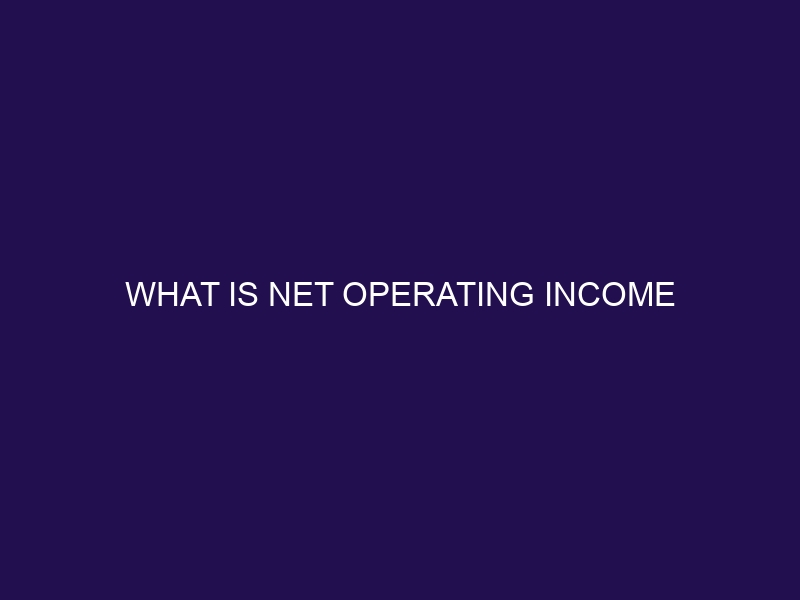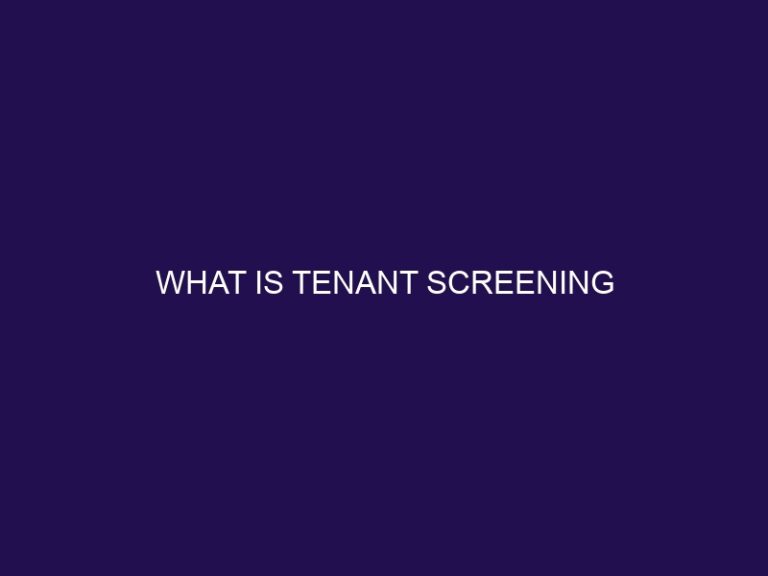What is Net Operating Income
Net Operating Income (NOI) is an important financial metric used in the real estate industry to assess the profitability and value of a property. It provides a clear picture of the property’s revenue potential by considering its operating income while excluding non-operating income and expenses, such as taxes and interest payments.
Understanding the definition of Net Operating Income is crucial in comprehending its significance in real estate investments. It represents the income generated from the property’s operations after deducting all operating expenses. By focusing solely on the property’s ability to generate income, NOI provides an accurate evaluation of its operational efficiency and performance.
The calculation of Net Operating Income involves subtracting all operating expenses, such as property taxes, insurance, maintenance costs, and management fees, from the property’s gross income. This process provides investors with a standardized measure to compare the financial performance of different properties and make informed investment decisions.
Net Operating Income holds great significance in the realm of real estate investments. It serves as a key indicator of a property’s potential for generating cash flow and profitability. NOI plays a crucial role in property valuation, as it directly influences the property’s market value and potential return on investment.
Analyzing Net Operating Income can reveal valuable insights about the property, such as its ability to cover expenses, attract tenants, and generate profits. It provides a comprehensive overview of the property’s financial health and overall investment potential.
Several factors influence Net Operating Income, including rental income, operating expenses, and vacancy rates. The rent collected from tenants contributes to the property’s income, while operating expenses, such as repairs, utilities, and property management costs, reduce the overall income generated. vacancy rates directly impact NOI, as higher vacancies result in reduced rental income and ultimately lower operating income.
Comparing Net Operating Income across different properties allows investors to evaluate their relative performance and profitability. By assessing NOI, investors can identify properties that offer better potential returns and make informed investment decisions based on their financial goals.
However, it is crucial to recognize the limitations of Net Operating Income. It does not take into account non-operating factors like financing costs, one-time expenses, or potential future market changes that could impact profitability. Therefore, while NOI provides a valuable assessment of a property’s financial performance, it should be supplemented with additional financial analysis for a comprehensive evaluation.
Understanding Net Operating Income
Understanding Net Operating Income (NOI) is a crucial aspect for investors in real estate investments. NOI serves as a significant metric to assess the profitability of a property. It represents the total income generated by the property, subtracting all operating expenses, such as property taxes, insurance, and maintenance costs. This understanding allows investors to determine both the cash flow potential and value of a property. Through the calculation of NOI, investors gain insights into the property’s income-generating capabilities, enabling them to make well-informed decisions. It is noteworthy that NOI solely focuses on the property’s operational performance, without considering financing or debt service costs associated with the property.
What is the Definition of Net Operating Income?
Net Operating Income (NOI) refers to the total revenue generated by a property after deducting all operating expenses and is a key measure used in commercial real estate. What is the Definition of Net Operating Income? It is defined as the income generated from the property’s core operations, excluding any income from non-operating sources such as interest or capital gains. NOI is a valuable metric for investors as it provides a clear picture of a property’s profitability and can be used to compare different properties. By understanding the definition of NOI, investors can make informed decisions and assess the financial viability of real estate investments.
The concept of Net Operating Income has been a cornerstone of commercial real estate analysis for decades. What is the Definition of Net Operating Income? The first recorded use of the term dates back to the early 20th century when real estate investors started analyzing property income and expenses to evaluate investment performance. Over time, NOI has become an essential metric used by investors, lenders, and appraisers to assess the financial health and value of commercial properties. What is the Definition of Net Operating Income? Its importance remains significant in the real estate industry today, shaping investment strategies and guiding decision-making processes.
Why is Net Operating Income Important?
Why is Net Operating Income Important?
Net Operating Income (NOI) is crucial in evaluating the financial performance of a property and determining its profitability. It serves as a key indicator for real estate investments.
NOI helps in assessing the property’s cash flow potential by calculating the income generated after deducting all operating expenses. This figure allows investors to determine why net operating income is important if the property is generating sufficient income to cover costs and provide a return on investment.
NOI helps in comparing properties. By analyzing the NOI of different properties, investors can assess their relative financial viability and make informed decisions on why net operating income is important in which properties to invest in.
NOI is important because it provides insights into the property’s overall value. Appraisers and potential buyers use NOI as a benchmark to estimate the property’s worth.
Understanding and considering why net operating income is important is vital for investors to make informed decisions and maximize returns on real estate investments.
How is Net Operating Income Calculated?
Net operating income is calculated by subtracting operating expenses from the gross income generated by a property. To determine how net operating income is calculated, follow these steps:
By performing this calculation, property owners can assess the profitability of their investment and make informed decisions regarding pricing, expenses, and potential opportunities for growth.
The Significance of Net Operating Income
The Significance of Net Operating Income
Net operating income (NOI) is a crucial financial metric that plays a significant role in assessing the profitability of a property or business before taxes and interest expenses. Understanding the significance of this metric is essential when making informed decisions about investments.
NOI provides a true reflection of the operational performance and profitability of an investment. By incorporating various income sources and excluding non-operating expenses, it allows investors to gauge the potential return and value of a property or business accurately.
A high net operating income indicates robust financial performance, which can be a magnet for attracting investors. It signifies that the investment has generated substantial income after covering all the operating expenses. Conversely, a low net operating income might indicate inefficiency or decreased profitability, making it crucial to investigate further before making any investment decisions.
Whether you are a seasoned investor or a novice, comprehending the significance of net operating income is vital. To ensure you maximize returns and make well-informed financial choices, it is advisable to consult with financial advisors or conduct thorough research on the subject.
Remember, net operating income is not just a mere financial number; it represents the fundamental performance of an investment and can greatly impact your financial outcomes. So, don’t overlook the significance of net operating income when analyzing investments.
How Does NOI Impact Real Estate Investments?
In the realm of real estate investments, the impact of Net Operating Income (NOI) cannot be overstated. As an essential metric, NOI gauges the profitability of a property by assessing its ability to generate income while factoring in operating expenses. With its significant influence, NOI directly shapes investment decisions, offering valuable insights into a property’s financial performance. Savvy investors leverage NOI to appraise the potential income stream and overall value of a property. A healthy NOI signals a robust return on investment, making the property highly appealing to potential investors. Conversely, a lackluster NOI can raise concerns, hinting at possible financial hurdles. In sum, NOI serves as a fundamental element for gauging the value and profitability of real estate investments.
What Can Net Operating Income Reveal About a Property?
Net Operating Income (NOI) provides valuable insights about a property’s financial performance. It reveals the property’s potential profitability and helps investors make informed decisions.
NOI can reveal the property’s ability to generate income, evaluate its operating efficiency, and assess its value. It accounts for rental income, operating expenses, and vacancy rates, giving a comprehensive picture of the property’s financial health.
NOI can indicate the property’s investment potential and compare its performance to other properties. It helps investors determine if the property can meet their financial goals and generate satisfactory returns.
Analyzing the net operating income can provide essential information about a property’s financial viability and guide investors towards making sound investment choices.
What Can Net Operating Income Reveal About a Property?
Factors Influencing Net Operating Income
When it comes to net operating income, several factors come into play. In this section, we’ll dive into the key influencers that can make or break your NOI. From rental income and operating expenses to vacancy rates, we’ll uncover the crucial aspects that directly impact your bottom line. So buckle up and get ready to explore the nitty-gritty details that have a significant say in determining your net operating income.
Rental Income
Rental income is a crucial aspect to consider when evaluating the profitability of a real estate investment. Here are some key factors to take into account:
- Rental Rates: The amount of rental income generated largely depends on the rental rates set for the property. Various factors such as location, property size, and offered amenities can influence the rental rates.
- Occupancy Levels: Achieving a higher occupancy rate contributes to an increased rental income. It is essential to minimize vacancies by implementing effective marketing strategies and tenant retention tactics.
- Lease Terms: The duration and terms of lease agreements greatly impact the stability of rental income. Long-term leases provide a consistent stream of income, while shorter leases offer flexibility but may result in more frequent turnover.
- Market Demand: Understanding the rental market in the area plays a crucial role in setting competitive rental rates. Analyzing factors such as supply and demand, local employment trends, and population growth can assist in determining the optimal levels of rental income.
- Operating Costs: Landlords must consider operating expenses like property maintenance, insurance, property taxes, and utilities when calculating rental income. It is imperative to ensure that the generated rental income covers these expenses and yields positive cash flow.
By carefully assessing these factors, investors can evaluate the potential rental income of a property and make well-informed decisions regarding its profitability.
Operating Expenses
Operating expenses play a vital role in calculating net operating income (NOI). These expenditures involve all the costs related to the operation of a property, including maintenance, insurance, utilities, and fees for property management. When dealing with operating expenses, it is crucial to:
- Budget: Properly allocate funds for various expenses to ensure the seamless operation of the property.
- Track: Continuously monitor and record expenses to closely monitor the financial health of the property.
- Analyze: Compare operating expenses with rental income to determine NOI and evaluate the profitability of the property.
- Optimize: Seek opportunities to reduce costs or enhance efficiency, such as implementing energy-saving measures or negotiating service contracts.
Vacancy Rates
“Vacancy rates play a crucial role in determining the net operating income (NOI) of real estate properties. These rates indicate the proportion of rental units that are currently unoccupied within a specific property. When the vacancy rate is high, the income generated and consequently the NOI are lower. Various factors such as location, property management, and market demand influence the vacancy rates. A lower vacancy rate is a positive sign as it suggests a more profitable investment opportunity. On the other hand, a higher vacancy rate hints at potential challenges in attracting tenants. Investors rely on vacancy rates to assess the financial performance and possible risks associated with a property before making investment decisions.”
Comparing Net Operating Income Across Properties
Comparing net operating income (NOI) across properties is crucial for real estate investors to make informed decisions. It is important to evaluate the NOI in order to assess the financial performance and profitability of different properties. By analyzing the income generated from rental operations and deducting operating expenses, investors can determine the NOI. In the provided table, you can see a comparison of the NOI for three properties:
| PROPERTY | RENTAL INCOME | OPERATING EXPENSES | NET OPERATING INCOME |
|---|---|---|---|
| Property A | $5,000 | $1,500 | $3,500 |
| Property B | $6,000 | $2,000 | $4,000 |
| Property C | $4,500 | $1,800 | $2,700 |
Analyzing the NOI data can help investors identify properties with higher potential returns and make wise investment choices.
Limitations of Net Operating Income
Net Operating Income (NOI) is a helpful financial metric for real estate investors; however, it does have its limitations. It is important to consider the limitations of Net Operating Income, which include the following:
1. Excludes debt expenses: NOI considers only operating expenses and overlooks debt payments. This can have an impact on the overall profitability of a property.
2. Does not account for capital expenditures: Major repairs or renovations can affect the long-term value of a property. Unfortunately, NOI does not factor in these costs.
3. Varies with market conditions: Fluctuations in rental rates or occupancy levels can influence NOI. Therefore, it is sensitive to changes in the real estate market.
4. Does not consider financing costs: Although NOI provides insight into a property’s operating income, it does not take into account financing costs or the impact of interest rates on cash flow.
It is important for real estate investors to be aware of these limitations when using Net Operating Income as a financial metric.
Frequently Asked Questions
What is Net Operating Income?
Net Operating Income (NOI) is a financial metric used in real estate to assess the profitability of income-generating properties. It is calculated by subtracting the property’s operating expenses from its income, including both rental income and ancillary income.
How is Net Operating Income calculated?
To calculate Net Operating Income (NOI), you need to determine the Gross Operating Income (GOI) first. GOI is the potential rental income minus vacancy rates. Once you have the GOI, you can calculate NOI by adding any other income sources and subtracting the operating expenses from the total income.
Why is Net Operating Income important?
Net Operating Income (NOI) is crucial for real estate investors as it provides a comprehensive view of a property’s income and expenses. It helps investors evaluate the potential profitability of an investment property and make informed financial decisions. NOI is particularly useful for comparing properties on an “apples-to-apples” basis.
How does Net Operating Income differ from Earnings Before Interest, Taxes, Depreciation, and Amortization (EBITDA)?
While Net Operating Income (NOI) is specific to the real estate sector and measures a property’s potential profitability, Earnings Before Interest, Taxes, Depreciation, and Amortization (EBITDA) is used across industries to analyze the operational performance of companies. EBITDA considers additional factors such as interest, taxes, and non-operating items.
What expenses are included in Net Operating Income calculations?
Operating expenses included in Net Operating Income (NOI) calculations generally cover costs associated with owning a property. Examples of these expenses are property taxes, insurance premiums, maintenance and repair costs, miscellaneous fees like property management and accounting fees, attorney fees, and marketing costs.
How can Net Operating Income help in assessing the profitability of property investments?
Net Operating Income (NOI) is used to determine the profitability of income-generating properties before considering factors like financing costs, taxes, and capital expenditures. By calculating NOI, real estate investors can assess the property’s potential return on investment and compare different investment opportunities in the preferred real estate market.







